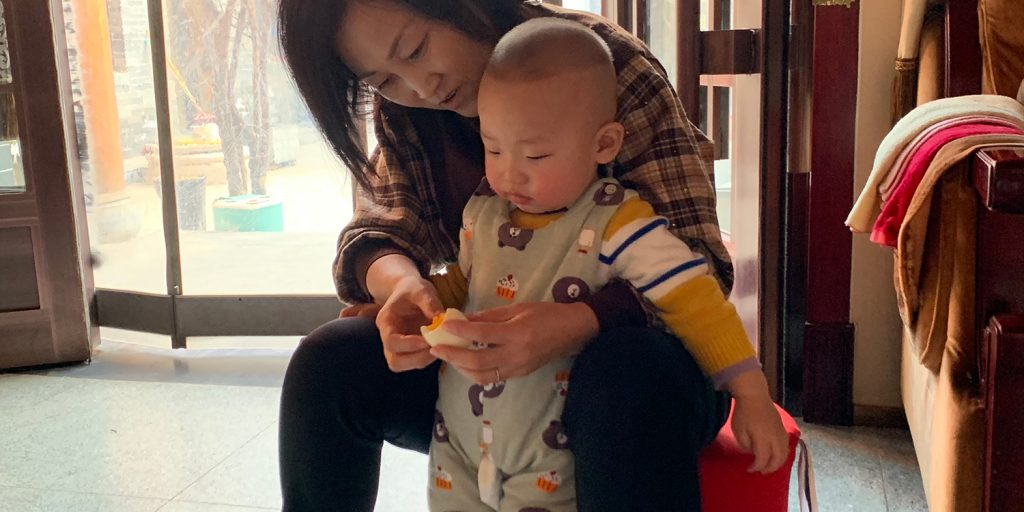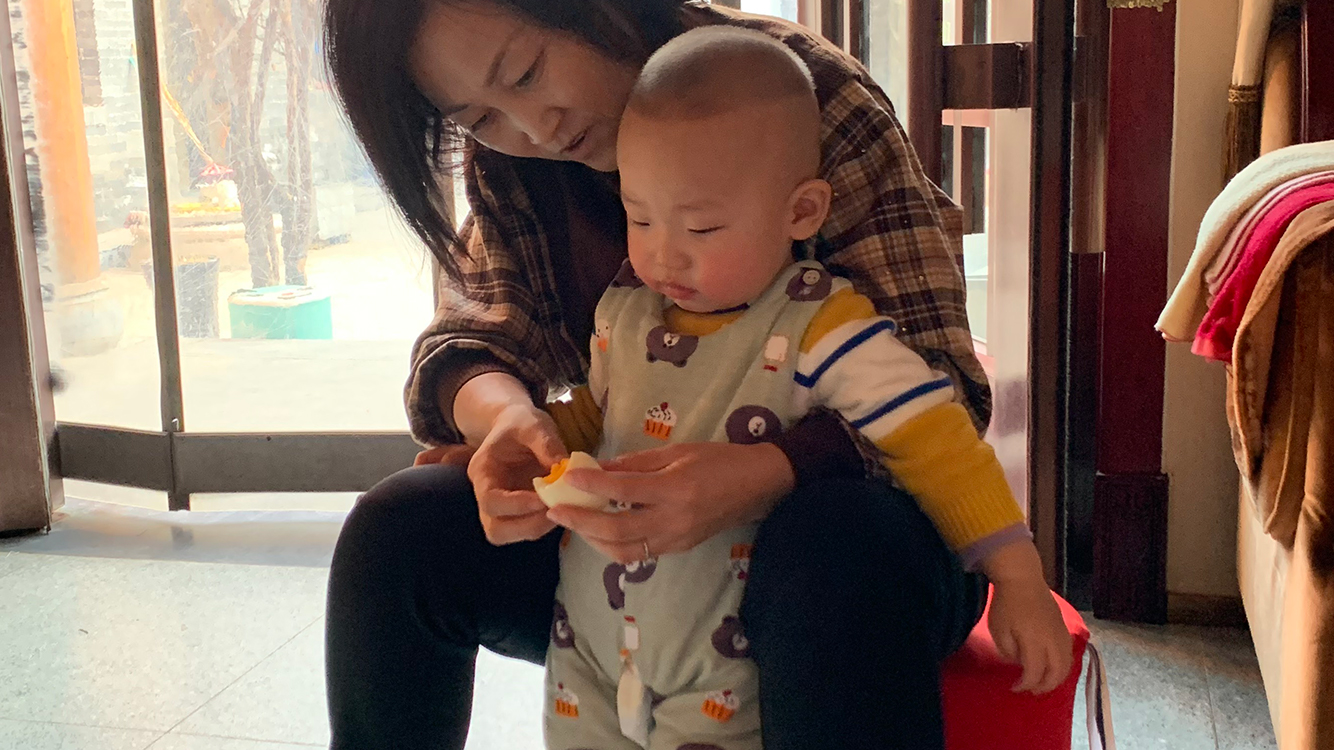More older couples are using surrogacy services to fill the gap after the death of their first child. But how hard is it to re-parent at this age and do the government need to put limits on who can access surrogacy services?

Xue Lu, 47, from rural Hebei, China, and her husband Chen’s greatest wish was to have another baby. The couple lost their son forever, who was in high school at the time, in a car accident four years ago.
“He was a good student, top of his class in every exam, and a very good person, especially a very good son.” As she said this, she took a tissue from the table and wiped her eyes.
After their only child’s accident, Xue and Chen were nearly devastated. At the age of 43, Xue looked ten years older, her hair had gone grey and her weight had dropped from 120kg to 98kg, she went to the hospital and the doctor said she was suffering from depression.
She was upset for her son and for herself. When she was a child, every family had many children, like the three siblings who grew up without much worry for their parents, how could it be her turn to be a parent and lose the child she had worked so hard to raise.

“I don’t know how those months passed, it was like a big piece of my heart had been cut out”.
Xue can no longer speak very clearly about the time just after her son left, except that neither of them ever went near their son’s room during that time, and they didn’t even dare to look through their son’s photos on their mobile phone.
Parents who share the same experience as Xue and Chen are known in China as “parents who have lost their children”. They are all in line with China’s one-child policy, introduced in 1979, which limits couples to a maximum of one child and is most strictly enforced in urban areas.
Although rural couples are allowed to have two children, this is restricted to cases where the first child is a daughter and neither spouse has any siblings.
When the one-child policy was first implemented, few people would have predicted that the “loss of a child” would turn from an individual experience into a social problem.
According to the Population Institute of the Chinese Academy of Social Sciences, in 2010, the cumulative number of deaths of only children in China reached 1.003 million.
This rate of increase will continue to accelerate in the coming decades, and by 2040, the number of children who die alone may increase to 380,000 a year. On this trend, it is expected that by 2050, the total number of families without a single child will reach 12 million.
Behind the increasingly large numbers are families who should be happy. In China, the loss of an only child is a nearly devastating shock to the family. On the one hand, these parents have little chance of having or adopting a new baby after the death of their only child, due to the psychological stress of being too old to have children.
On the other hand, because of the imperfection of the national social security system, some of them rely on their children to finance and care for them in their old age, and once they have lost their only child, they are likely to be in an old age crisis.
But even though Xue and her husband were advised by many people to adopt a baby, the couple could not accept it. They felt that having a baby immediately would betray their poor son. “I didn’t want my son to think we had forgotten about him.”
Two years passed, and the time did not ease the pain of losing their son. On the contrary, the missing of her son was a constant burden. Finally, Xue Lu could not bear it and bought a grave next to her son.
Before she died, she went to see a monk at the temple. The master said, “Death is not a door, you cannot see your son through death. The master also said that you should not keep running to the graveyard to talk to your son, disturbing him and preventing him from being reincarnated.

Then death is a meaningless thing. How would she survive the long decades if she continued to live?
When she got home, Xue didn’t know what to do, she lay in her son’s bed and closed her eyes. Depression made it almost impossible for her to sleep naturally without sleeping pills, so perhaps she was too tired and went to sleep.
It was the first time she had dreamt of her son since the accident, he was smiling at her, she tried to call out to him, but no sound came out of her mouth, he was getting further and further away from her, and she struggled to wake up.
When she woke up, she cried to her husband and told him about the dream. She was afraid that she had caused her son to die and not be reincarnated, but he cried and said, “He is worried about you, he wants us not to worry, we must live well and not make him feel bad in heaven. “
A year after the death of their son, Xue and her husband, Lao Chen, began to think for the first time about how to “live a good life” in the future. At first, Xue and Chen wanted to go to a public hospital for IVF.
According to the rules of IVF in Chinese hospitals, women over the age of 45 are not accepted for IVF. Xue Lu, who was already 44 years old, felt lucky that she was so close to not qualifying.
The public hospitals are crowded with people doing IVF. Standing in the dense crowd at the hospital, Xue felt a little apprehensive. After she managed to queue up to see the doctor, she was told that she did not qualify for IVF in China as her records showed that she had previously taken anti-depressants.
No matter how much she begged, the doctor just told them to go back and think about it. Unwilling to give up, Xue and her husband travelled to Beijing, Shanghai and Guangzhou and went to every hospital they could, but they all got the same result.
The couple also turned to the doctors they knew at the time to help them. The couple also called the Wenchuan orphanage in Sichuan to see if there were any children whose parents had died in the earthquake. They were told that they had all been taken away.
They called orphanages in Beijing, Shanghai, Hefei and Tangshan, where all the normal children were taken away, and the couple went to see the disabled children with cleft lips, hydrocephalus and enlarged spinal cords. But in the end, logic prevented them from going to the orphanage, as their family could not afford the medical expenses of these children.
At this point the doctor friend they had met before contacted them and said they should try surrogacy. Xue and Chen didn’t know what surrogacy was at first, but only after their friend explained it to them did they understand.
Surrogacy is a form of assisted reproduction in which a fertile woman uses human assisted reproduction techniques to nurture embryos for another family until the baby is born. The resulting baby is biologically unrelated to the surrogate mother.
It was only after a friend had explained it to Chen that he understood it. The simple understanding was that “Xue did not have to give birth to the baby herself, but the baby was born to the couple themselves.” How is this possible? Chen didn’t believe it at first, “how could it be so good?”
He had been worried ever since he decided to have a baby. It was too dangerous to have a baby at Xue Lu’s age. But if he wanted to adopt a baby, he didn’t know when he would have to wait, and since the adopted baby was not related to him or her, he or she would be afraid that the baby would find out about his or her origins and become estranged from them when he or she got older.
So, when he found out that surrogacy would allow Xue Lu to have her own baby without having to give birth at an advanced age, Chen was so excited that he didn’t sleep that night.
But compared to her husband, Xue was a little worried because she understood from her doctor friend’s subtle attitude that surrogacy was not an open thing. She was a little worried, but looking at her husband, who hadn’t been so happy in a long time, she couldn’t care less.

Although it has been explicitly stated twice since 2001, when the Chinese Ministry of Health promulgated the Measures for the Administration of Assisted Human Reproductive Technology and in 2003, when the Ethical Principles for Assisted Human Reproductive Technology and Human Sperm Banks were promulgated, that medical personnel are not allowed to perform surrogacy techniques.
However, the regulations here only bind formal medical institutions and medical personnel, and there is no explicit prohibition on individuals and intermediaries engaging in surrogacy.
Moreover, the types of punishment given are administrative penalties and criminal liability, but the exact offences involved are not specified. Most importantly, there is no mention of the interests of the surrogate, the client and the baby in the regulations.
In June 2017, Xue Lu and her husband found a surrogacy agency, and the head of the agency said that their package would cost 600,000 (equivalent to around £50,000). This is not a small amount of money for a family like theirs who run a small business.
Although there are also those agents who only need more than 400,000 yuan, But her husband, Chen, felt that both of them were too old, and that there were not many opportunities, and that they would not dare to do anything that was not sure to succeed.
So, in the end, Xue and Chen borrowed money from friends and relatives and barely to raise enough money.
Xue Lu still remembers that when she signed the agreement with the surrogacy agency in December, she said, “I want the baby to be healthy”.
“At such an old age, I still have to do this kind of thing.” Xue said with some sadness. At first, the agent told the couple that Chen’s sperm was of poor activity and would result in a low embryo survival rate.
If they were in a hurry, the company could provide a few sperm donors for them to choose from or let Chen try again sometime later after he had adjusted his lifestyle.
Chen was frustrated, but Xue reassured him that he had reached this stage and there was no need to panic. In order to be able to provide good quality sperm and eggs, her husband gave up his 10-year smoking habit and started going out for a run every day to exercise; Xue Lu also stopped taking anti-depressants and went out to play whenever she could to adjust her mind.
Finally, in 2018, after the two had been physically recuperating for most of the year, Lao Chen’s sperm activity met the criteria. five days later the agency sent a message saying that Xue and Chen were lucky and that a total of six embryos had survived in the end.
The agency had transferred two embryos into the womb of a surrogate woman. When the surrogate woman gave birth, the couple would be able to have the baby of their dreams.
Knowing this, the couple went to their son’s grave the same day to tell him the news. “Son you’re going to have a brother, mum and dad are fine, just rest easy.”
In April 2019, Xue Lu and her husband finally got their second baby. They spent a total of 680,000 yuan on the journey to find a baby, spending all their savings and owing a lot of money to relatives. But the birth of their son, Lele, made Xue feel relieved that “finally someone is calling me mother again”.
Although the Chinese government encourages families to help themselves by means of re-birth or adoption, once they have succeeded in helping themselves, they will no longer be part of the lost family and will no longer be able to enjoy the care of the lost family support policy. Many families are caught in a difficult life situation because of re-birth and adoption.
This is why Yang Li, a deputy to the National People’s Congress, suggested in 2017 that consideration be given to granting discretionary special support to those who have lost their children at the age of 40 and above.
At the time, China’s National Health Planning Commission said it needed to conduct a comprehensive study before it could answer this question, but four years on there is still no answer.
Despite having just turned 50, Xue Lu, who has experienced the loss of her son, looks older than her peers. When she takes her son Lele out to play, she is often asked: “Is this your grandson? She always answers “Yes, yes”, “Whatever they think, I know it’s my son anyway”, she says.
But Xue Lu is still more dressed up than ever before, wearing eyeliner and nail polish on a daily basis, hoping that “at least it’s not that bad” and never letting her son walk around sloppily dressed and look like she was brought up by a grandmother who didn’t care about what her children wore.
Although talking about the baby’s future plans, Xue Lu is still a bit worried, “I can only support him until he is 18 at most, and he will have to walk the rest of the way on his own.”
